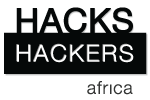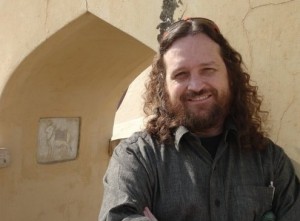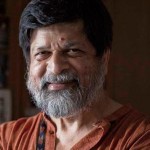Richard Sambrook: ‘The values of traditional journalism still matter’
After years of hype surrounding the rise of social media and the Internet as alternative sources of news and information, a growing number of voices are warning that traditional journalistic standards of objectivity and impartiality are still necessary even in the digital age. One of them is journalism professor and former head of BBC news Richard Sambrook.
In a recent study, Sambrook (@sambrook) writes of serious concerns about the quality and practices of news media. While acknowledging that it is difficult to enforce professional standards in the digital age, he concluded it would be “dangerous” to “disregard such standards”. DW Akademie’s Steffen Leidel discussed these issues and more with Richard Sambrook.
![]() read more
read more
Justin Arenstein: Hacks and hackers working together in Africa
 As new media continues to reshape the world of journalism, newsrooms need to reinvent themselves to stay relevant. But not all journalists and organizations have the technological skills to become innovative news providers. This is where Hacks/Hackers is stepping in to fill the gap. Hacks/Hackers is a grassroots journalism organization which brings together journalists and software developers. Originating in the United States, chapters of the movement are rapidly spreading around the globe, including Africa. The idea is to hook up hackers (developers and software writers) who sort and visualize information together with hacks (journalists) who are excited about using new technology to tell great stories.
As new media continues to reshape the world of journalism, newsrooms need to reinvent themselves to stay relevant. But not all journalists and organizations have the technological skills to become innovative news providers. This is where Hacks/Hackers is stepping in to fill the gap. Hacks/Hackers is a grassroots journalism organization which brings together journalists and software developers. Originating in the United States, chapters of the movement are rapidly spreading around the globe, including Africa. The idea is to hook up hackers (developers and software writers) who sort and visualize information together with hacks (journalists) who are excited about using new technology to tell great stories.
 Justin Arenstein is one of the driving figures behind the Hacks/Hackers movement in Africa, where there are currently 13 chapters. Arenstein, a South African, is currently a Knight International Journalism Fellow in charge of the Digital Innovation Program at the Africa Media Initiative. He also is a consulting strategist for Google on data and digital journalism issues (Twitter: @justinarenstein). DW Akademie’s Kate Hairsine talked to him about Hacks/Hackers in Africa.
Justin Arenstein is one of the driving figures behind the Hacks/Hackers movement in Africa, where there are currently 13 chapters. Arenstein, a South African, is currently a Knight International Journalism Fellow in charge of the Digital Innovation Program at the Africa Media Initiative. He also is a consulting strategist for Google on data and digital journalism issues (Twitter: @justinarenstein). DW Akademie’s Kate Hairsine talked to him about Hacks/Hackers in Africa.
![]() read more
read more
Interview: journalism of the future
Everyone agrees that journalism is undergoing radical changes. But many questions still remain unanswered about what direction it’s taking. How will stories be told differently in a multimedial future? How will research change as social media, crowd-sourcing and data-driven journalism open up new sources of information? And importantly, how will journalists earn a living as ever increasing numbers of people consume their news online? German journalists Caterina Lobenstein and Amrai Coen sought answers to these burning questions by visiting journalists, bloggers and activists on a whirlwind trip around the world. DW Akademie’s Kate Hairsine talked to Caterina Lobenstein about the search for the journalism of the future.
![]() read more
read more
What makes a person digitally literate?
Bangladeshi new media pioneer Shahidul Alam tells DW Akademie about the skills and tools that make a person digitally literate. In this interview, he talks about the way to improve digital literacy in Bangladesh and the meaning of more internet access in the country.
UNESCO has defined digital literacy as “the ability to understand and use information in multiple formats from a wide range of sources when it is presented via computers”. With the emergence of social networking, digital literacy has become a major factor in enabling people to raise their voices, communicate, collaborate and pursue wide-scale social and political reforms.
People begin to think digitally when material things are not the only measurable items, Shahidul Alam says. As a promoter of new media, he helped introduce email to Bangladesh in 1994 and set up the first web portal in the country. Alam is also a founding member and advisor in the LEARN Foundation, which is dedicated to information and communication technology (ICT) training in rural regions.Watch the video interview and find out more:
![]() read more
read more
Understanding your target audience
By Bettina Ruigies
Today’s fast moving media environment requires a lot of flexibility from media workers. Multimedia skills are a must. Journalists need to be able to produce stories for radio or television, print or online. At the same time, digitization, the Internet and affordable equipment enables anyone who wishes to open a TV station on YouTube or at least run a blog site.
All this technical innovation offers tempting perspectives for hard working and talented journalists. But frustration and failure might set in when it turns out that hardly anybody is watching or reading.
![]() read more
read more
What is ‘open journalism’?
 Britain’s Guardian newspaper strongly supports open journalism. The Guardian’s editor-in-chief, Alan Rusbridger, wants to engage readers and users. He wants to integrate their knowledge, skills and opinions into the reporting.
Britain’s Guardian newspaper strongly supports open journalism. The Guardian’s editor-in-chief, Alan Rusbridger, wants to engage readers and users. He wants to integrate their knowledge, skills and opinions into the reporting.
Rusbridger’s philosophy is that “journalists are not the only experts in the world.”
In a recent online chat, Alan Rusbridger explained how he understands open journalism:
![]() read more
read more
Live blogs reveal a huge appetite for information

Photo credit: Flickr/@afloden
![]() read more
read more
The biggest media company in the Philippines aims for the Internet generation
"Don't wait for the young audience to listen to the radio. Go to where they are – and that means going online and going social networks," says Peter A. Musngi. He is the head of the Manila radio division of ABS-CBN, the largest media company in the Philippines.












Feedback